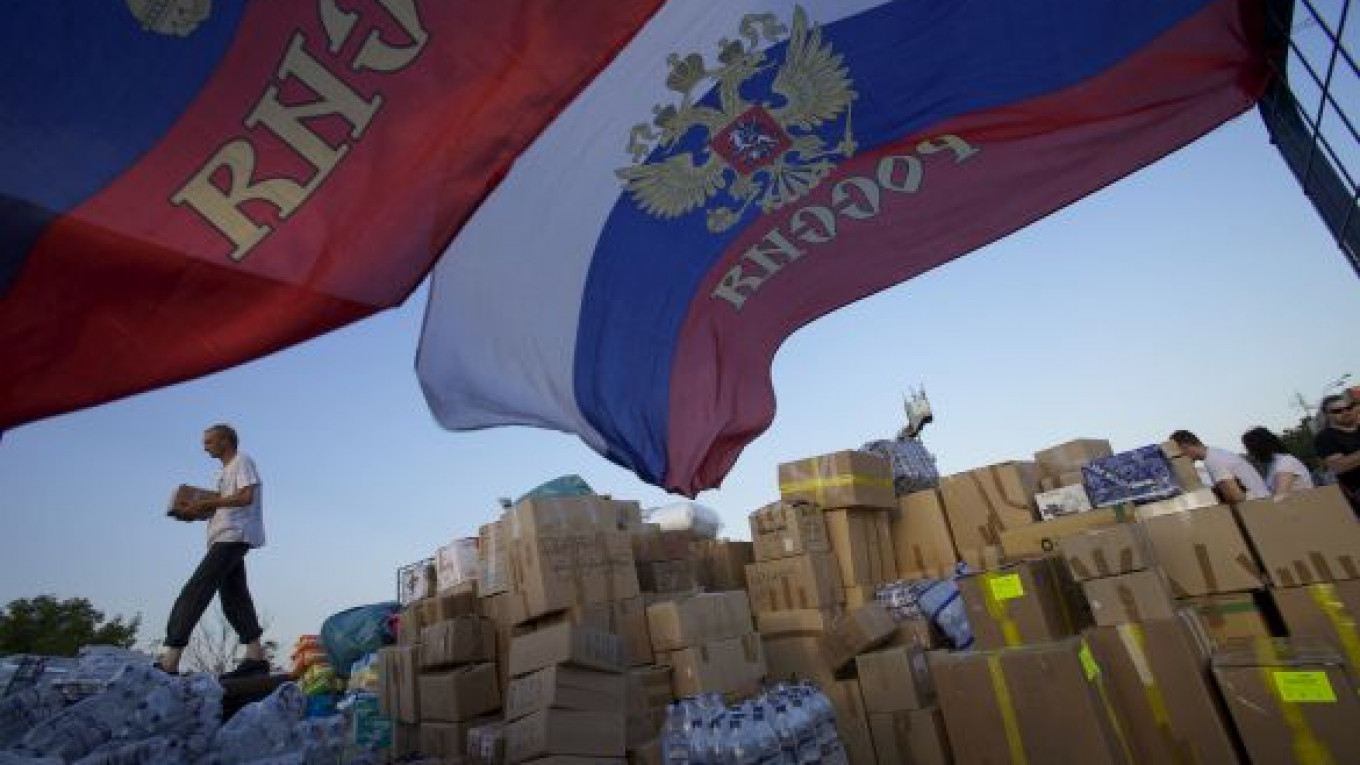Hundreds of Muscovites from all walks of life have brought food, medicine and other necessities to a drop-off point for people who lost everything in last weekend’s devastating flood in the Krasnodar region.
The death toll rose Tuesday by one to 172 people, the Emergency Situations Ministry said.
The drop-off point, located in the Moscow Central District’s prefect office at 70a Prospekt Mira, has collected more than 20 tons of canned food, clothes and medicine, coordinator Ksenia Davidson said.
“This destroys the popular belief that Muscovites are indifferent. Everyone is ready to offer a hand,” said Davidson, who was busy coordinating volunteers and packaging goods for shipment to the Krasnodar region Tuesday night.
Mayor Sergei Sobyanin said the city of Moscow would donate 500 million rubles ($15.2 million) to rebuild infrastructure, including schools and kindergartens, in the region.
Prime Minister Dmitry Medvedev told a government meeting that the construction of new housing would start Aug. 1 and be completed by October.
Davidson said people have also brought children’s clothes, irons and even some unusual items, like four bottles of vodka donated by one man.
Some people who brought goods to the drop-off point said they were driven by a general distrust of the authorities.
“We often know that the authorities make promises, but they don’t often fulfill their obligations,” said Nadezhda, a woman in her 30s who brought children’s clothes in a sports bag.
Another woman, Natalya, a student from the Tver region, said she felt close to Krymsk, which suffered the highest death toll, 149 people. “This city is very dear to me because my friends live there,” she said, depositing a package of female hygiene products at the collection point.
Both women declined to give their last names, saying they didn’t want any attention for their generosity.
Hastily organized storage centers in Krymsk are overflowing with donated goods from around the country, said Vladimir Kolba, a wedding photographer in Krymsk.
While expressing gratitude, Kolba also spoke about the level of devastation in his native town, population 57,000. “You walk around the town, you can see that it almost does not exist anymore,” he said by phone. He added that his apartment still has no light.
About 17,000 people remain without power in Krymsk, according to the local branch of the Emergency Situations Ministry. Emergency Situations Minister Vladimir Puchkov said Monday that it would take three to five days to re-establish the town’s normal functions.
The flooding, the worst to hit the region in 70 years, has caused upward of 4 billion rubles ($121 million) in damage.
Alexander Kazlikin, the Krasnodar emergencies chief, said Tuesday that the authorities could not have foreseen the deadly wall of water that roared through Krymsk. “The wave passed through half the town at a height of 5.95 to 6.98 meters,” Kazlikin told RIA-Novosti. “It was impossible to predict such a wave.”
Some 9,700 emergency workers and 2,500 volunteers are involved in relief efforts in Krymsk, but the Krasnodar regional administration said more volunteers are needed.
“Although a huge force of rescuers and equipment is concentrated here, there is an urgent need for workers,” it said in a statement on its website. “To carry out work in difficult circumstances, it is essential to have physically strong people.”
It said additional volunteers were expected to arrive soon and advised them to bring camping gear, construction tools and personal hygiene items.
Kommersant reported that emergency workers were running low on supplies and have appealed for rubber boots, pneumatic saws and respirators. But the Emergency Situations Ministry denied the report, saying workers have all the tools that they need.
A Message from The Moscow Times:
Dear readers,
We are facing unprecedented challenges. Russia's Prosecutor General's Office has designated The Moscow Times as an "undesirable" organization, criminalizing our work and putting our staff at risk of prosecution. This follows our earlier unjust labeling as a "foreign agent."
These actions are direct attempts to silence independent journalism in Russia. The authorities claim our work "discredits the decisions of the Russian leadership." We see things differently: we strive to provide accurate, unbiased reporting on Russia.
We, the journalists of The Moscow Times, refuse to be silenced. But to continue our work, we need your help.
Your support, no matter how small, makes a world of difference. If you can, please support us monthly starting from just $2. It's quick to set up, and every contribution makes a significant impact.
By supporting The Moscow Times, you're defending open, independent journalism in the face of repression. Thank you for standing with us.
Remind me later.






